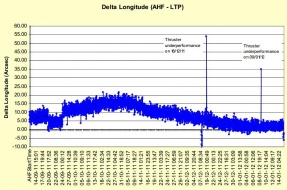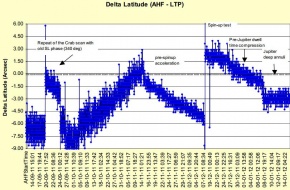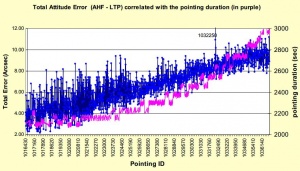Pointing performance
The pointing performance of Planck can be measured by the difference between the executed pointings as described in the Attitude History Files (using the Star Trackers and the Fiber Optics Gyroscope), and the planned pointings by PSO in the Pre-Programmed Pointing Lists.
The MOC makes available to DPCs and PSO the reconstituted pointing information:
- the positions on the sky of the three axes bound to the ACMS system (ASTR) every second (quaternions or equivalent information).
The accuracy of this information complies with the requirements stated in the SRS document.
- For each circle (i.e. nominally a 60 second observation period), the spin axis position on the sky and spin velocity averaged over this circle plus the spin
phase.
- For each ring (i.e. nominally a ~ 1 hr observation period), the spin axis position on the sky, spin velocity and nutation parameters averaged over this ring.
- Any information the MOC has that might help the DPCs in assessing the quality of the above information.
The attitude history file contains high frequency data for slews, post slew and stable pointing periods at a maximum frequency of one record every 0.25 seconds. It also contains data averaged over a spin period and data averaged over an observation period. For the spin period and observation period, the information used to construct these data records is restricted to stable pointing periods.
The pointing performance of Planck has been very good throughout operations, as the plots above show.
Planck Science Office
[ESA's] Mission Operation Center [Darmstadt, Germany]
Attitude Control & Measurement Subsystem (AOCS)


